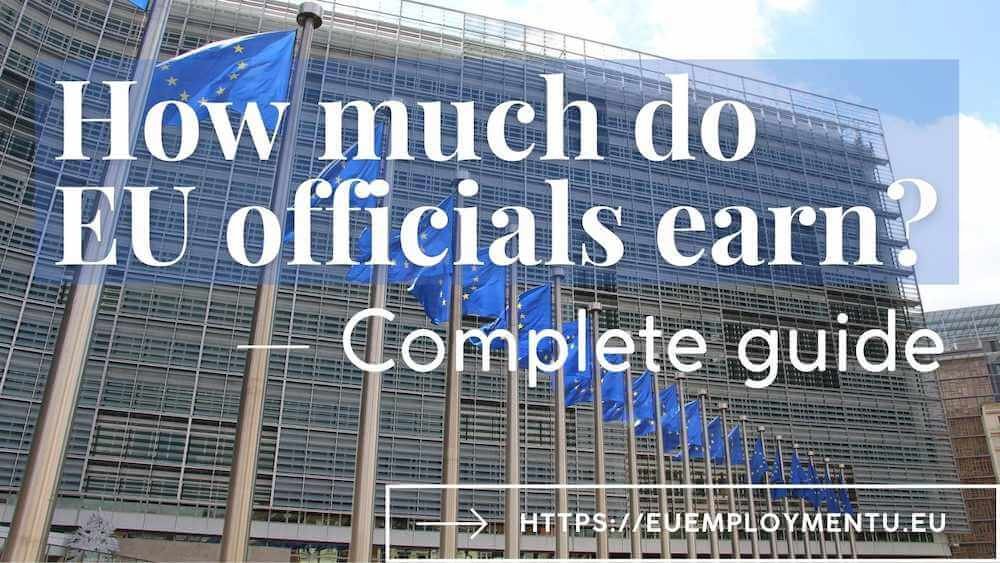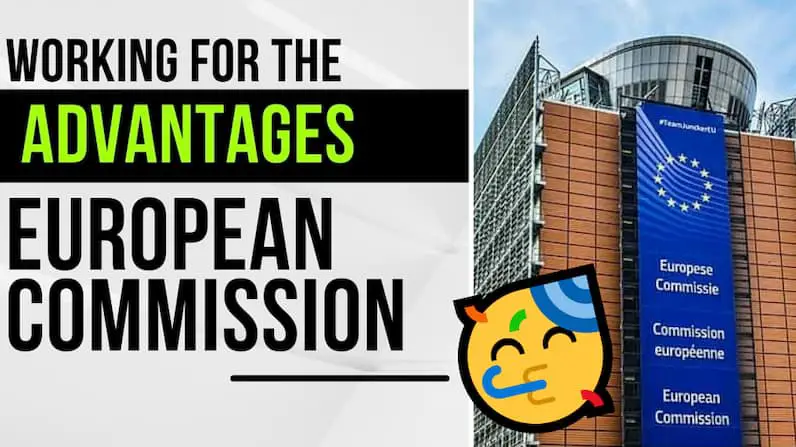If you are here, chances are you googled “Why people work for the European Commission?” or something similar. This article will list 16 advantages as seen from an insider. As I haven’t found a good article about all the advantages of working for EU institutions, I’ve decided to write one myself.
By the way, the benefits are the same no matter which EU institution you join – European Commission, European Parliament, European Council, any of the EU agencies or some other EU institutions.
Most people who have not worked for EU institutions are probably not aware of all of these benefits, and the European Commission and other EU institutions do not do a very good job of advertising them.
01| Salary 💶
Salaries at the European Commission and other institutions are very competitive for most Europeans. Period.
Unless you come from a Scandinavian country or one of the few more affluent European states, pay in EU institutions is quite competitive, especially at entry-level positions (contract agents FG III and FG IV as well as administrators AD 5). For most Southern, Central and Eastern Europeans, you are easily making three times and more in salary for pretty much the same or even less demanding job and responsibilities compared to what you would take home on a payday in your home country.
The salary is adjusted to cost of living in the particular EU country you are working in by something called the ‘correction coefficient’. It is also adjusted to inflation/deflation at least once a year.
On top of that your salary will increase every two years as move up a ‘step’ in the EU salary grid. How much that is you can see in European Commission salary scale tables. Based on good performance, you can also be “reclassified” (which stands for promotions in EU lingo), leading to even faster salary increases.

Article about salaries of EU officials
02| Pension 👴🏻👵🏻
The possibility to earn an EU pension after just 10 years of working for an EU institution is, in my opinion, one of the least appreciated EU benefits. If you work for more than 10 years at an EU institution, each additional working year increases your pension. Normal retirement age is 66, but one can also retire as early as 58 as long as you are willing to take a permanent deduction of the pension amount. EU institutions’ pensions can be inherited by spouses.
The 10 years of service don’t have to be accumulated all at once, but can be collected over a person’s lifetime. If you don’t collect the necessary 10 years of service, it is possible to “transfer out” your pension capital to private pension scheme.

Article about pensions for EU officials
03| Health insurance ❤️
Have you ever heard about JSIS, the Joint Sickness Insurance Scheme? No! I also hadn’t heard about it before I joined my first EU institution. However, JSIS, the EU institutions health insurance scheme is nothing short of amazing. It covers you and your immediate family. But, best of all, JSIS reimburses 80-85% of most healthcare costs, even medicines.
If you retire on an EU institutions’ pension, you and your spouse continue to be covered by JSIS until death.
04| Allowances 💰
The ‘basic salary’ is not the only pecuniary reward employees of EU institutions get. Depending on your individual and family situation, you can be entitled to a number of EU allowances on top of your salary. These can boost your basic salary by anything from 10 to 80%.
If you have moved to a different city or a country, if you have a spouse and/or children, if you have a long work experience, these and other factors can qualify you for a number of other allowances on top of your salary.
Below is a more or less complete list of allowances that staff of EU institutions may be entitled to. If the allowance name is hyperlinked, there is an in-depth article about it for further reading.
- Daily subsistence allowance during probation period.
- Household allowance.
- Expatriation allowance and foreign residence allowance.
- Childcare allowance.
- Education allowance.
- Travel allowance.
- Unemployment allowance.
- Birth grant.
- Death grant.
05| European School 👩🏫
EU institutions’ employees with children do not have to worry much about where to send their kids to school. In all European Commission locations and a large number of EU agency locations there are European Schools. EU institutions’ staff do not have to pay any school fees if their kids attend European Schools.
If there is not a European School in the location of your institution, you are entitled to an Education Allowance that at least partially compensates any school fees. Often EU agencies in locations without a European School have arrangements in place with a number of schools and compensate them directly for children of agency staff.
For parents pre-school-aged children there is a significantly smaller Childcare allowance. Some agencies have equalized the Education and Childcare allowances to attract staff with smaller children.
06| Annual leave and travel grant 🏖️
EU institutions’ staff are entitled to at least 20 working days of annual leave by default. That’s a full calendar month of paid holidays each year. Expats (those who have moved to a different country) get additional 2,5 days of leave added to their ‘holiday allowance’. You can also get additional leave days for age and for doing special tasks at the institution, e.g., being a fire marshal.
EU institutions’ staff also get a travel grant once a year for each family member that is meant to compensate for the return to your home country during your annual leave.
07| Interesting work 👩💼👨💼
Work for EU is not only about the financial and similar benefits. Whether you are at the European Commission, the European Parliament, the European Council, the Court of Auditors, or any of the EU agencies, your work can be extremely interesting and rewarding, often at the “cutting edge” of a policy field.
Even if you have taken the first job available to get into an EU institution, once in, you are much more likely to be able to move to a position that is better aligned with your interests and strong suits.
If you are not able to find a perfect match between your interests and a position at a particular institution, you can always apply to a different institution. As said elsewhere in this post, the fact of already having worked for an EU institution is an advantage for further applications.
08| Job security 😌
While the EU institutions have become much more dynamic than in the past, they are still one of the places where one can find substantial job security. It is harder to attain for contract agents, but if you are an administrator (AD5 to AD16), once you pass the probation period, if you want to you can almost certainly expect to spend the rest of your life in an institution, just changing your roles from time to time.
Even for contract agents, most if not all EU agencies offer indefinite contracts to staff in grades FGI to FGIV. If you are a contract agent in the European Commission, the longest duration of your contracts in one post will be six years. However, most people find their next position during the last two years of the six-year period.
09| Moving and settling-in assistance 🚚
There is a significant support to EU staff who have to relocate to a different city or country. First of all, you can get your moving expenses compensated. Secondly, you are also entitled to something called the Daily Subsistence Allowance during your nine-months-long probation period.
The larger institutions also have dedicated staff that assist all new colleagues in getting settled in. This entails contacts with national institutions, helping to get permits etc.
10| Business travel ✈️
If you like travelling for work, EU institutions might be a good fit for you. Even if you work in a fairly regular position, with EU agencies in 40+ EU locations, you are almost certain to regularly go for various work meetings (these are called “missions” in the EU lingo) outside of your place of employment. Then there are the EU Presidencies that “change hands” from one EU country to the next every 6 months.
If travel is something that greatly motivates you, try to find a position where you have to work with EU neighborhood countries or states even further afield. The most obvious choice is the External Action Service, but “regular” European Commission and EU agencies staff can get their fairs share of travel as well if they are working, for example, with the EU candidate countries in the Western Balkans region or a country in which the EU has a strategic interest in.
While the travel allowances paid to staff of EU institutions travelling for work/going on missions are nothing fancy, they are completely sufficient to enjoy a good restaurant in the evenings, unless your inclined to save them up towards your financial “cushion”.
11| Training 📚

EU institutions are quite serious about training. As part of the annual appraisal, each employee gets to set a personal development plan that can and should include professional training. If you are assigned new duties, you can also request training to improve the relevant skills. On top of that, employees have access to a multitude of online courses in a special “EU Learn” portal. The European Commission and most other institutions also organize regular trainings on various topics throughout the year that are open to all interested staff on a ‘first come first serve’ basis.
12| Contributing to the “EU project” 🌍
While this is the most esoteric advantage covered in this post, it would probably be mentioned by quite a few EU institutions’ staff. It indeed is something special to contribute, even in a small way, towards the larger ‘European project’.
EPSO, the European Personnel Selection Office, has prepared a series of videos where EU staff tell about their jobs and “contributing to the EU project” is mentioned in quite a few of them.
13| Making a career 📈
The European Commission and other institutions within the EU system are an excellent place where to try to make a career (see the #EUcareers hashtag on Twitter).
The best chances of making a career are if you land a job as an administrator in grades AD5 and up. Only administrators are entitled to mid- and upper level managerial roles. Having tenure in a lower grade is often a precondition for applying to a position in a higher grade, e.g., AD5’s can apply to AD7 positions more easily, as would AD9-12s to AD13+. In competitions or ‘concours’ institutions often give preference to candidates that have previous experience in some EU institution as this guarantees better institutional and cultural fit (at least so the thinking goes).
If you are interested in a steadily increasing salary, administrators positions are also better suited to this. As an administrator you are advancing automatically over the salary scale steps every two years. Upon stellar performance you can be reclassified to a higher grade.
It is a bit harder (ok, actually, quite a bit harder) to make a career in EU institutions if you are a contract agent. In this case your contract is usually time-limited to 6 years in the European Commission (some agencies, though, offer permanent contracts to contract agents). You can advance just in your own grade (FG I to IV) over the steps, unless you are reclassified due to superb performance. That being said, there are many administrators who started out as contract agents or even seconded national experts and interims some time ago. Their secret of success in passing a competition for administrators’ positions was the chance to be within the EU system where learning is much easier than while being on the outside.
Most EU institutions give a substantial benefit to candidates that already are employees of the particular institution or have worked in the network of EU institutions before. As working for the EU “is not everyone’s cup of tea”, prior experience ensures a better match for a vacancy. Additionally, the person would be familiar with most administrative procedures that are the same in all institutions.
14| Language learning 🔤
The European Commission and other EU agencies are mandated to promote multilingualism to promote the development and use of all EU languages. All EU staff are required to master at least two EU languages when starting to work in the ‘institutions’, and three EU languages at the time of getting and indefinite contract or their first promotion (reclassification).
There are a number of support mechanisms EU institutions have in place to support staff in learning new EU languages. All institutions organize regular free-of-charge language classes that can be attended during working hours. For those preferring more effective or tailored learning methods, it is also possible to get a private tutor, online classes or similar solutions. In the latter cases one pays for these out of pocket and gets reimbursed later.
Read the explainer on three EU languages requirement in EU institutions.
15| Disability-friendly employer ♿
Do you have a disability or another physical or mental impairment? As long as you feel that you can perform tasks mentioned in a vacancy announcement, you should definitively apply for EPSO competitions or the separate hiring procedures run by each EU agency.
EPSO on behalf of the European Commission and the European Parliament and other EU institutions are equal opportunity employers that have credibility when it comes to hiring people with various handicaps. This also applies after the initial hiring as you can safely assume that all the necessary accommodation will be implemented to make your work environment and sometimes even the schedule as comfortable and accommodating as possible.
If your disability is considered a “serious health condition”, you will receive even more favorable JSIS terms – instead of 80-85% healthcare costs reimbursement you might be entitled to 100% reimbursement of costs for a specific condition.
Read the article on disability and employment in EU institutions
16| Generous unemployment benefits ⛅
If your contract ends or you decide to leave the EU institutions temporarily or for good, each former employee is entitled to the European Commission unemployment leave and unemployment allowance. Each year worked will give you four months of unemployment leave, hence, if you’ve worked for the European Commission or another EU body for three years, you will receive the allowance for a year, and six years of employment will give you up to two years of unemployment leave and allowance. Click on the link above to find out more about this.
Do you have any comments on the article? Have I missed any of the benefits or other advantages? Please let me know in a comment!







9 responses to “16 benefits of working for the European Commission”
Hi Ben,
Please tell me, technically, how the salary it is calculated (what is add monthly to the basic salary and what not, at what stage the deductions and correction is applied) and what are de percentages apllied to the gross salary?
Thank you in advance for your answer if you know it. Hug
Hi! The webiste has a number of articles on this precise topic. Please take a look at https://euemployment.eu/how-much-do-eu-officials-earn/ and this for administrators: https://euemployment.eu/category/administrators-ad5-to-ad16/ There are similar sections on contract agents and secretaries/clerks.
Hi,
Are the salaries taxed (in Belgium) like any other job? Meaning your gross is almost divided by 2 to become net?
Hi, the salary you earn in the Institution is taxed – as any other job – by a so called ‘community taxation scheme’ (complex) system but does not follow the scheme of your Member State. The taxation scheme used is progressive and goes up to 45% but this depends on the hight of your salary and the taxation thresholds you reach. Belgium is hard to beat for its taxes …
Hi! National taxes are not applied to the salaries from EU institutions. You can gain an insigth about what to expect from the European Commission and other EU institutions in Brussels from these two articles:
AD5 salaries: https://euemployment.eu/ad-5-salary/
Salaries at the Single Resolution Board in Brussels (the numbers would be identical for the Commission institutions, the Parliament and the Council): https://euemployment.eu/srb-salaries/
Hi Ben,
Thanks for this detailed article. I have a question. I’ve been offered a 5 year contract with the possibility of renewal at an EU agency. If the contract is renewed then let’s say I will have 10 years of service or perhaps 9 years 11 months and 30 days (?). Will I qualify for the pension scheme, or will I miss it for “just one day” ?
Another question I’ve got, are there internal role for always existing EU employees or do I have to go through the whole process from scratch? Let’s say I am three years into my contract and I find an AD 5 position can I apply as an internal candidate?
Many thanks!
Hi, pension scheme entitlements are min 10 years of service. Less will be a transfer to your national sytem and no community pension.
On the second part of your question, that depends on the conditions of that AD5 position (best to contact point when it is published or the notice text). Sometimes there are also ‘internal’ competitions where they allow certain type of contract agents to apply (to be checked too in the conditions).
Hi Ben, thank you for the useful information. Do you know if EIB positions come with the same conditions, they are also subject to the Protocol of Privileges and Immunities of the European Union but not sure if the same benefits apply as the EU institutions
Hi! EIB is not counted among the regular set of EU institutions. While somewhat similar to EU institutions, the EIB has its own staff regulation, salary and benefits structure. There’s plenty of information on the EIB website, you can google “eib salaries and allowances” for a nice list of resources.